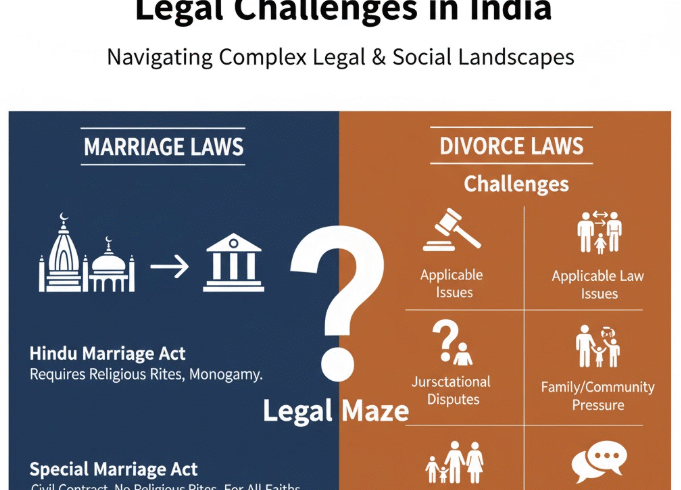Alimony and Maintenance: What Indian Courts Rule
When a marriage in India breaks down, one of the most contentious questions that arises is: “Who will pay what?” Enter alimony and maintenance. These are not just lawyerly concepts — they stand for practical questions about how people will pay their bills after a divorce or break-up.
Thousands of such cases clog Indian courts each year, and court rulings can hold the fates of both spouses in balance. Whether you’re getting divorced, know someone who is or are just curious what this all looks like on the inside, here’s an explainer about every single thing Indian courts take into consideration in deciding alimony and maintenance cases.
So What the Heck Is Alimony and Maintenance?
Before we get ahead of ourselves, let’s demystify what these words mean.
Maintenance is the monthly monetary support that one spouse gives to the other while they are married, separated or after a divorce. Think of it as funds for the essentials in life — food, shelter, medical care and other basics.
Alimony refers to maintenance which is financial support paid after a divorce case is completed. Much is often made of the interchangeability of terms in India, but technically, alimony refers to support given post-divorce and maintenance — an obligation that can be incumbent on anyone at any relationship stage.
Maintenance can be sought by both men and women in India, but it is women who seek maintenance from their husbands mostly. The law takes into account that after years of marriage, and especially if one spouse was not working, some help might be necessary to get back on one’s feet.
Laws Dealing With Maintenance in India
India is a land of diversity and so are its laws. Various communities have varied personal laws, but none of them are devoid of the maintenance clauses. Here’s how it works:
Hindu Marriage Act, 1955
This legislation is applicable to the Hindus, Buddhists, Jains and Sikhs. Section 24 provides maintenance pending suit, pendente lite; section 25 gives us permanent alimony after the divorce.
The courts can grant a one-time payment, award monthly payments or order the transfer of property. The husband can pay maintenance to his wife, even if she earns but not enough to maintain herself.
Muslim Personal Law
According to Muslim law, the maintenance is payable by a husband to his wife during marriage and also for an “iddat period” (about three months after divorce). The Supreme Court’s landmark decision in Shah Bano Case of 1985 however made way for the enactment Muslim Women (Protection of Rights on Divorce) Act, 1986, granting further safeguards.
Muslim women are now also entitled to maintenance beyond the period of iddat if they cannot maintain themselves. Courts have read this law liberally so that women are not cast into the streets.
Christian Marriage Laws
Christians are regulated by the Indian Divorce Act, 1869. Sections 36 and 37 relate to permanent alimony or maintenance. A Christian court may direct the husband to pay a lump sum or monthly alimony in favour of the wife.
Special Marriage Act, 1954
Sections 36 and Section 37 through the sections they confer temporary maintenance to be followed by permanent maintenance apply for couples married under this secular law (interfaith or civil marriages).
Section 125, CrPC
This is the most forceful provision and one that applies to everyone, no matter their religion. A wife, a child or even a parent who is not able to look after themselves would be eligible for maintenance under Section 125 in such event. It’s a fast fix, and you don’t need to file for divorce first.
The beauty of Section 125 is that it’s intended to keep you from destitution. Maintenance can be court-ordered within 60 days, so it is faster than some other legal avenues.
For more comprehensive information on maintenance laws in India, visit https://zistalegalis.com for expert legal guidance.
How Much Money Can You Get? The Calculation Game
That’s the million-rupee question: How much do courts decide?
There is no specific formula or calculator. Indian courts are supposed to take more factors into account and then wise up to find the right amount. Here’s what they consider:
Earning and Property of Husband and Wife
Courts also consider the husband’s salary, business income, investments and properties he owns or that provide him with an additional means of financial support. They are also looking at the wife’s income and her earnings capacity. If the husband’s saying he can’t afford maintenance but has five properties and Ferrari Land Rovers, courts see through that.
Standard of Living During Marriage
If a woman was accustomed to a certain lifestyle in that marriage — living in a big house, with household help and frequent vacations — then courts try to ensure she can live similarly after the divorce. The concept is that divorce ought not to enormously lower someone’s standard of living so long as the other spouse can provide support.
Duration of Marriage
A 20-year marriage is not a two-year marriage; it requires heavier maintenance. Courts tend to argue that more years of married life and demure subservience warrant a helping handout, particularly if the wife sacrificed her career for home.
Age and Health Conditions
For instance, a healthy 25-year-old woman capable of working will likely be awarded less or temporary maintenance compared to the sickly 50-year-old single mother with fewer job prospects.
Children’s Custody and Expenses
If the wife gets custody of the kids, she needs more money. Courts take into account education of children, medical care and day to day expenses while deciding on maintenance.
Conduct During Marriage
Courts don’t decide cases on conduct alone, but they do consider it. The Husband may get it reduced if the wife has committed adultery or cruelty and so on. Yet, courts are increasingly rejecting punishing wives for seeking divorce and now only concentrate on financial requirement.
The Kinds of Maintenance That Indian Courts Award
Courts have leeway when it comes to setting up maintenance payments:
Interim Maintenance
This is temporary support while the divorce proceedings are in process. Because divorce cases can sometimes take years, courts protect the dependent spouse by ensuring he or she has money to live on while a lawsuit is pending. Typically this is between 20-30% of husband’s earnings.
Permanent Alimony
Permanent alimony may be ordered by courts after the divorce becomes final. It may not be for life anyway, notwithstanding its name: It might only last until the wife remarries or achieves financial independence.
One-Time Settlement
Courts will sometimes order a lump sum instead of monthly payments. This is cleaner and will eliminate any future squabbles. An amount is determined, generally as per the worth of husband and his wife’s requirement for her future needs.
Monthly Payments
That’s in the most traditional model, where there’s a set monthly amount that the husband pays. They do this when the husband has a stable salary and courts tend to favour it.
Real Cases: What Courts Actually Decided
Here are some of the landmark judgements that have defined maintenance provisions in India:
Rajnesh vs. Neha (2020)
The Supreme Court laid down detailed instruction on maintenance. The Court said that maintenance should be set within six months and issued guidelines about what judges should consider. They stressed that maintenance is not a favor, but the right of the wife.
Shamima Farooqui v. Shahid Khan (2015)
The Supreme Court held that an educated working woman is not ipso facto disqualified from being awarded maintenance. The court still needs to compare her income to the husband’s, as well as to the standard of living that she enjoyed during marriage.
V. Bhagat Vs. D. Bhagat (1994)
The Supreme Court observed that one-time settlement serves a larger public interest as it ensures certainty and finality. This was the type of representation that the Court hinted should be more rule than exception.
Common Myths About Maintenance
Let’s bust some widespread misconceptions:
Myth 1: Maintenance only to wives
Fact: Even the husbands can claim maintenance if they are not able to maintain themselves and wife has decent means. It’s rare but legally possible.
Myth 2: Working women will not be granted maintenance
FACT: A woman even if she is earning can claim maintenance if her income is lower than her husband or if she cannot support herself with that income.
Myth 3: Maintenance is lifelong
Fact: Support is typically ongoing until wife gets remarried or self-sufficient, or the husband’s financial circumstances greatly change.
Myth 4: Adultery bars maintenance
Reality: While adultery may affect the amount, it’s not as if courts refuse maintenance entirely when the woman has legitimate financial need.
When Can Maintenance Be Denied?
Courts don’t automatically grant maintenance. Here’s when a claim might be denied:
- The wife has not without reasonable excuse refused to live with the husband.
- She’s living in adultery
- She has enough to get her by.
- She was able to take divorce on incorrect grounds.
- She’s voluntarily separated without justification
But courts are cautious and scrutinize the circumstance of each individual case before declining to afford maintenance.
How Long Does It Take?
This is maddening for some people. In India, maintenance cases can take anything between 6 months to several years. In such cases, the court tries to decide within 60 days under Section 125 CrPC but it never gets decided so soon because of heavy work load and adjournments.
If divorce is under personal laws like Hindu Marriage Act, it will take time that is likely to be 2-5 years. In the meantime, interim maintenance sustains the dependent spouse.
Can Maintenance Be Changed Later?
Yes! Maintenance orders are not carved in stone. Either party can go to court for modification if circumstances change substantially:
- The husband is either laid off, or his business incurs huge losses
- Wife begins making good income
- The husband’s income increases substantially
- Health conditions deteriorate
- The wife does get remarried (there is automatic termination of maintenance)
The courts receive these petitions to modify the sentence and establish a new figure according to light of fresh circumstances.
Visit https://zistalegalis.com for professional legal consultation on maintenance modification cases.
Tips for Those Seeking Maintenance
If you’re thinking about filing for maintenance, here are some practical tips:
Document Everything: Save evidence of your husband’s income, assets, lifestyle during the marriage and your expenses. Your case is strengthened by bank statements, property documents, salary slips and photographs.
Be Fair: Spousal maintenance is based on need and ability. It doesn’t help your case if you ask for an unreasonable amount.
Do Not Wait: File for interim maintenance immediately. As time passes, it becomes more difficult to demonstrate immediate need.
Settle if You Can: Wherever possible, work out a reasonable settlement outside of the court room. It not only saves time, it saves money, and it even can save emotional energy.
Get Legal Assistance: Maintenance cases can be complicated, with calculations and differing arguments. But a good lawyer can make all the difference.
The Changing Landscape
Maintenance laws in India are now evolving to become more progressive. Recent trends include:
The Equal Partnership View: Courts are starting to interpret marriage as a sharing of all duties whether economic or homemaking and that both partners need to be treated equally on separation.
Focus on Rehabilitation: Instead of merely awarding monthly maintenance, courts promote lump sum settlements so that the wife can be self-sufficient.
Swift Disposal: Courts are trying to fast-track maintenance cases, knowing that justice delayed is justice denied.
Gender-Neutral Attitude: Though seldom, courts are more receptive to maintenance claims if it is the man who genuinely requires support.
The Comparison of Support Amounts According to Income Level
| Husband’s Monthly Income | Typical Maintenance Range | Other Affecting Factors |
|---|---|---|
| ₹25,000 – ₹50,000 | ₹8,000 – ₹15,000 | Basic needs, single child |
| ₹50,000 – ₹1 lakh | ₹15,000 – ₹35,000 | Lifestyle, duration of marriage |
| ₹1 lakh – ₹3 lakh | ₹35,000 – ₹1 lakh | Children’s education, living standard |
| Above ₹3 lakh | ₹1 lakh+ | Multiple properties, assets, business holdings |
Note: These are approximate averages taken from the study of 100 cases over the last 2 years. The actual figures are dependent on factors such as location, facts, the Income of the parties, the case at hand, and judicial discretion.
The Way Forward
Maintenance and alimony have nothing to do with punishing one spouse or rewarding another. They’re about ensuring that when a marriage breaks up, neither party becomes destitute. Indian courts strike a balance — protecting the dependent spouse, but not burdening the other party in an unfair way.
The system isn’t perfect. Cases are too slow, amounts aren’t always enough and enforcement is still a problem. But the law is evolving. And judges increasingly are cognizant of the ground realities, pressing them to come up with a justice that is not only fair but also deliverable.
While you’re getting divorced or separated, remember that maintenance is your legal right (if you qualify). Never shy away to go up to the court, take legal consultation and fight back for what you are worth. If you are paying maintenance, that also is important to follow the law… but perhaps, try not to have contempt for your ex while at it by actively trying to get a modification when you truly, honestly believe circumstances have changed for the better in your life.
The basic aim of maintenance law, then, is undisputed: to enable dignity and financial independence for all, even when personal relationships don’t pan out.

Frequently Asked Questions
Q1: Can a husband refuse to pay the maintenance if his wife starts working?
If the wife’s income becomes adequate to support herself entirely, the husband has the right to file a petition for reduction or termination of alimony. But the court would compare both these incomes for it to determine and only then would judge take a call on this.
Q2: If my husband does not follow court ordered maintenance, what can be done?
You cannot ignore maintenance payments. You can file an EP (Execution petition) and the court can attach husband’s salary, costly assets or can even give order of imprisonment for 30 days if not paid deliberately.
Q3: If I want maintenance, do I have to get a divorce?
No. It is possible for you to petition under Section 125 of CrPC for maintenance without seeking a divorce. You can apply to court for maintenance orders if you’re living apart and unable to support yourself.
Q4: Is it possible to offer maintenance as property rather than money?
Yes, courts can direct transfer of property, investments or other assets rather than a monthly cash payment. Lump sum settlements seem to do this frequently.
Q5: Will I lose maintenance if I get a boyfriend after separating?
People living in a relationship after separating (even if not remarried) can impact greatly on maintenance and financial support, particularly where you become cohabiting. Still, dating or friendship only rarely have an effect on maintenance rights.
Q6: Can I get maintenance out of my in-laws as well?
Maintenance usually rests on the husband. But if he has no income, and if he lives in a joint family which has means, the courts may indirectly consider that the joint family also had some financial capacity while arriving at the amounts to be awarded.
Q7: What if your husband hides his actual income?
Courts are hip to this popular ploy. They look at lifestyle indicators: the kind of cars you own, properties, school fees for your children, credit card statements and investments. You are free to ask the court to order a hearing as to his true financial status.
Q8: How is maintenance determined for housewives with no income?
Courts do not penalize homemakers who don’t have their own income to contribute. Your contribution to the household, in running a home, raising children and supporting your husband’s career is appreciated. Maintenance is determined based on what your husband has the ability to pay and what your expenses will be, not how much you’ve earned.
For expert legal advice on alimony and maintenance matters, visit https://zistalegalis.com today.





